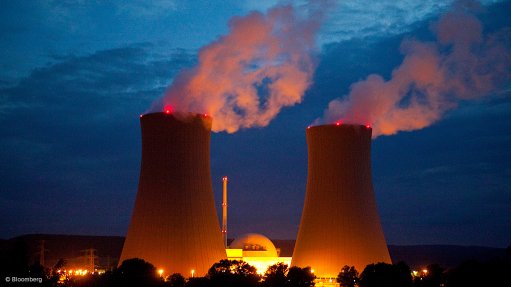
Photo by: Bloomberg
State-owned power provider Eskom on Wednesday released a request for information (RFI) to the market for its nuclear new build programme, which will add 9 600 MW to the national power grid when completed.
The RFI aims to gather data including experience related to recent nuclear projects, capacities and costs, proposed financing solutions and localisation opportunities.
The Nuclear Energy Corporation of South Africa (Necsa), which will together with Eskom procure the programme’s front-end fuel cycle facilities, welcomed the RFI.
This is the first step leading to the appointment of one or more foreign specialist suppliers who will work will the South Africa team in the construction of the new fleet of nuclear power stations, Necsa said in a statement.
Necsa chairperson Dr Kelvin Kemm noted that this was “an exciting move”.
“Over forty years ago, in collaboration with foreign partners, South African embarked on the construction of Koeberg nuclear power station. That decision turned out to be a great success. This time around we can do even better,” he said.
Necsa CEO Phumzile Tshelane added that the organisation has been operating a nuclear reactor for over half a century. “We know what we are doing and are pleased to be working together with Eskom on this challenging road, which can deliver so much.”
The RFI requests countries which wish to submit bids to supply nuclear power station technology to South Africa to indicate that they are intending to bid, by answering questions relating to localisation of construction and fabrication technology, training schemes, intellectual property sharing and exposure, and other issues which will form the basis of any large-scale mutually beneficial construction programme.
The programme aims to procure generation capacity to ensure energy security and to facilitate the achievement of the greenhouse gas emission targets for South Africa and long-term alternatives for Eskom’s current baseload fleet.
“The basic idea of the ‘fleet approach’ for the 9 600 MW of power is that as one reactor is being built, the acquired technology skills are then seamlessly moved over to the next reactor. In this way, we not only establish new technology foundations, but we also keep costs down by using a production line system,” Tshelane noted.
The RFI will be followed by two rounds of request for proposals during which time the proposals as to the exact layout and format of the new nuclear power plants will be refined. Time frames for construction, and nature and method of construction, will also be agreed between the parties.
This will be followed by the integration of the requirements of the National Nuclear Regulator, which has legislative authority over issues related to public safety.
Information gathered through the RFI process will also be used to supplement Eskom’s response to the current draft Integrated Resources Plan.